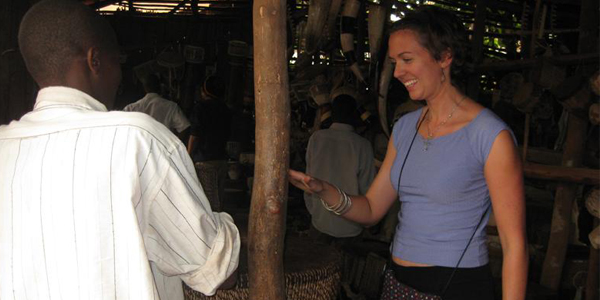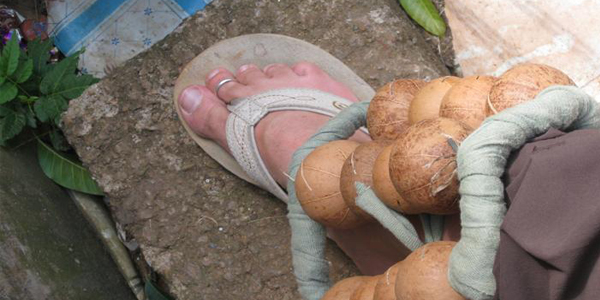Stall stands tell stories: what grows, what people eat, how they dress, talk and spend their money. Budget travelers need not shy away from the bustle simply because they’re not planning to buy. In fact, going penniless to the bazaar usually proves more interesting than wandering with a wad of cash. Not sure what to do besides shop? Consider one of the following agendas:

How to Visit Foreign Markets and Bazaars With Respect
Get the Goods on Your Goods
Go ahead, eyeball the abalone necklace you can’t live without. Yet instead of asking its price, discover who made it, where and how the abalone was harvested, how it was cut and carried to the market. Does it have a singular origin or will you see this same piece of jewelry throughout your travels? What should you look for in a good piece of abalone?
Query as much as you can, and do so from several vendors; answers might vary, which makes finding the truth more challenging. Later, when you are ready to purchase your necklace, you’ll be armed with information and guaranteed to grab a fair deal.
Practice Bartering
Attempt two kinds of bartering during your penniless walk: first, “get off my back” bargaining, where you try to rid yourself of unwanted hawkers. Low ball your first offer and when the vendor counters, toss out a figure lower than the first. For example, go from five shillings to three, then down to two. The salesperson won’t know what to do with you, and is likely to become frustrated and give up.
Second, practice “I gotta have this” bartering. Choose an item you have no interest in: say a Peewee Herman coaster set. Because you’re sussing out prices for something you’d never buy, your emotions won’t play a role; you could haggle all day long and not care.
See how low the vendor will go, but be careful not to agree on a price; otherwise, the expectation is that you’ll buy the item. Use the final price as an indicator of fair market value for other items. As a general rule of thumb, let the salesman declare the first price; work down from there.
Meet the Locals
Gossip, recipes and village news sell faster in the market than on the street. Take advantage of shoptalk and chat it up with a friendly looking salesperson. Inquire about his or her family, home, and work life. Ask for their favorite place to eat or how to make a local dish (don’t be surprised if they show you how to make it right then and there).
Have a well-dressed vendor explain traditional dress; ask about good hotels and must-see alleyways. If time is on your side, find a particularly welcoming local and visit him or her several days in a row. You’ll brighten their day and broaden your cultural experience.
Learn the Language
Purchase a local lexicon without spending a Lincoln: bring along a notebook, a pen and your best ear. At one stall, or many, inquire about common words and phrases in the local dialect. Start with ‘please’ and ‘thank you.’ Add ‘My name is’ and ‘How much?’ Write down the turns of phrase and practice them with your new local tutor. Both of you are bound to share a good laugh.
If they are interested, reciprocate by teaching the vendor a few of your own words they might use in their business. Enhance your vocabulary as you wander through the market: learn the word for “daisy” and “water” at the flower stand; “eggs” and “meat” from the butcher.
Set Out on a Scavenger Hunt
If traveling with others, devise a list of items you may find at the market. If traveling solo, ask people back home to email suggestions. Bring along a digital camera and capture the items on your list, one by one (be certain to ask for permission before taking a photo). Deem one person responsible for organizing the judging and a prize, be it a handmade certificate, a beer at dinner, or a group high-five.
Award points based on creativity, time spent, and quality of photos. To spice it up even more, dole out bonuses for including locals or a Where’s Waldo type of character in each picture.
Trade Trinkets
Ready to ditch your Levi’s because they take up too much space? Bring ‘em to the market. Establish their value beforehand, and what you’d like to acquire in their place. Surely, the abalone necklace will take up far less room, and since you already know the worth of the necklace, you’ll know if the trade will be fair.
Keep the item to be traded out of sight as you begin to barter and whittle the vendor down as much as you can. After acting disappointed at his lowest price, feign an epiphany, whip out your 501’s and negotiate a trade. This trick works wonders at street-side book and clothing stands. Remember though, not everyone is interested in your faded denim, so don’t throw a tantrum if your swap doesn’t suss out.
Finally, if headed out to the shops with friends, designate a central meeting place, as someone is bound to get lost. And as you walk away from the dizzying, colorful madness that is the market, count your memories—not your goods or your pennies—to validate an afternoon well spent.


